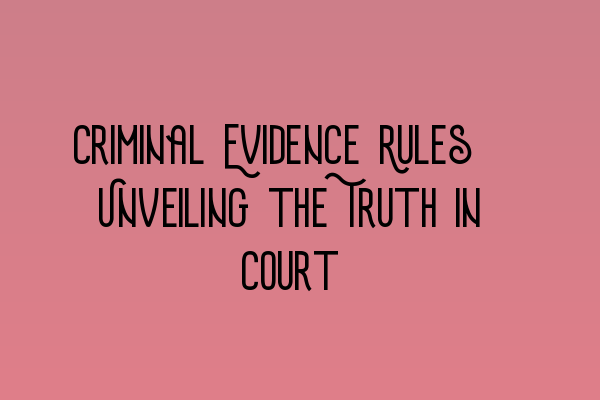Criminal Evidence Rules: Unveiling the Truth in Court
Welcome to the SQE Criminal Law & Practice Law UK blog, where we provide valuable insights into the legal field. In today’s post, we will delve into the intricate world of criminal evidence rules and how they play a crucial role in uncovering the truth in court. Whether you are a practicing solicitor, a law student, or simply someone interested in criminal law, this article will provide you with a comprehensive understanding of the subject.
The Importance of Criminal Evidence
In any criminal trial, evidence serves as the foundation upon which both the prosecution and the defense build their respective cases. It is the proof that either supports or refutes the claims made by each party. Without proper adherence to the rules governing the admission and exclusion of evidence, the pursuit of justice becomes a convoluted and potentially unjust process.
In light of this, it is crucial for legal professionals to have a firm grasp of the criminal evidence rules. These guidelines, set forth by the legal system, ensure that evidence presented in court is reliable, relevant, and obtained lawfully.
The Admissibility of Evidence
One of the key aspects of the criminal evidence rules is the admissibility of evidence. Admissible evidence is material that is allowed to be presented in court and considered by the judge or jury when making their decision. Evidence that is inadmissible, on the other hand, cannot be used in the determination of guilt or innocence.
There are various grounds on which evidence may be deemed inadmissible. These include:
- Hearsay: When an out-of-court statement is offered as evidence to prove the truth of the matter asserted.
- Illegally Obtained Evidence: Evidence that has been obtained in violation of a person’s rights, such as evidence obtained through an unlawful search or seizure.
- Character Evidence: Evidence that relates to the character or reputation of the accused, which is generally considered irrelevant to the question of guilt.
Understanding which pieces of evidence are admissible and which are not is essential for building a strong case. Properly presenting admissible evidence can significantly influence the outcome of a trial.
Exclusionary Rule and Exclusionary Exceptions
The exclusionary rule is a fundamental legal concept that aims to deter illegal police conduct and protect individuals’ constitutional rights. Under this rule, evidence obtained through unlawful means is generally excluded from trial. The goal is to prevent law enforcement agencies from gaining an unfair advantage by disregarding individuals’ rights.
However, there are exceptions to the exclusionary rule. These exceptions allow for the admission of unlawfully obtained evidence under specific circumstances. Some notable exceptions include:
- Inevitable Discovery: When the evidence would have been inevitably discovered through lawful means.
- Good Faith: When law enforcement officers reasonably believe their actions are lawful, even if it is later determined that they were not.
- Independent Source: When evidence is properly obtained through an independent, untainted source.
It is important for solicitors to be aware of these exceptions to effectively advocate for their clients and navigate the complexities of the criminal justice system.
Conclusion
Understanding criminal evidence rules is essential for anyone involved in the criminal justice system. By being well-versed in these rules, solicitors can effectively challenge evidence, present admissible evidence to bolster their case, and ensure a fair trial for their clients.
If you found this article informative, you may also be interested in the following related articles:
- SQE 1 Practice Exam Questions
- SQE 1 Practice Mocks FLK1 FLK2
- SQE 2 Preparation Courses
- SQE 1 Preparation Courses
- SRA SQE Exam Dates
Stay tuned for more insightful articles and resources on SQE Criminal Law & Practice Law UK.
